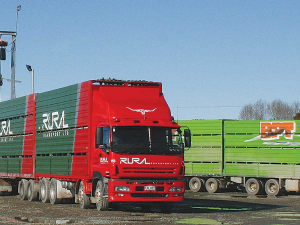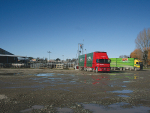Live animals trapped in a truck for six hours in Auckland's summer heat is not acceptable in anyone's view.
Sadly, this is what happened in the most recent Covid-19 Level 3 lockdown when the road border crossing could be described as a shemozzle.
This has highlighted a number of things for the Road Transport Forum (RTF), and the livestock transport companies we represent. Firstly, we cannot understand how, one year on from Covid-19 becoming a global pandemic, the Government still can't organise an effective lockdown road border. It should be playbook by now.
As a consequence of all the people going into Auckland at the start of the Level 3 lockdown being stopped and questioned, traffic built up south of the Bombay Hills for many hours. No one can understand why people were being stopped going into Auckland when they had A: been told to go home and B: would be unlikely to want to go into a Level 3 lockdown if they could stay outside that zone.
Any situation where animals are trapped on a truck creates problems for the driver. They are covered by a number of laws, rules and regulations; more so than many other truck drivers who carry freight that is not alive and/or perishable.
The Auckland border delays caused considerable stress for drivers and animals and the RTF believes this should not be allowed to happen again, ever.
Stress for drivers comes not only from seeing animals suffer, but also in trying to be compliant with all the rules and regulations that cover the transporting of animals.
The things drivers need to consider are:
- The animal's health and welfare - they should not be hurt in any way during transport and should have adequate air, food and water, and rest (if needed)
- Disposal of effluent from the animals going to the toilet on the truck - there are tanks on the trucks and places to take care of emptying those tanks, but not if you are stuck in traffic for six hours
- Driver health and safety - drivers are only allowed to work a certain number of hours to ensure road safety standards are maintained, but if they bust those hours when they are sitting in a truck in traffic they can't just walk away and leave the animals. In the Auckland border situation, there was no way to get relief drivers to sub-out those stuck in trucks.
The truck driver is just one part of the chain of responsibility for ensuring animal welfare. The animal's welfare journey starts on the farm, and if they are sold, then through the sales chain which may include going to sale yards to be sold.
Truck drivers are to some degree, the meat in the sandwhich. They are not farmers, livestock sales people, or vets. Yet they are held to very high standards regarding the condition of the animals they transport.
There are a lot of checks for the truck drivers to ensure the animals they are taking on the truck are in good condition when they start the journey. But there are also a lot of situations where they rely on the farmer, or whoever is transporting the stock, to ensure that if loading happens when it is dark, or the animal has a condition that is not visible and would only be picked up by a farmer/vet.
This is one area of the supply chain the RTF is turning its resources to as we want to ensure all parts take responsibility and it is not transport operators alone who wear the costs if it fails.
Unfortunately, it is usually the truck driver or operator who is fined, but so often it can be for actions that were beyond their control.
Nick Leggett is chief executive of the Road Transport Forum.










